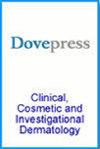Independent Risk Factors for Postoperative Recurrence of Patients with Primary Extramammary Paget’s Disease: A Retrospective Analysis
IF 1.9
4区 医学
Q3 DERMATOLOGY
引用次数: 0
Abstract
Background: Extramammary Paget’s disease (EMPD) is a rare skin cancer with unclear pathogenesis, insidious progression, and high recurrence rate. The purpose of this study was to investigate the clinical features and postoperative recurrence factors of primary EMPD.Methods: We retrospectively analyzed the medical records of 40 patients with primary EMPD who underwent wide local excision surgery at a single medical center between 2009 and 2019. Risk factors for recurrence of primary EMPD were analyzed using multivariate binary logistic regression.
Results: The study included 40 patients with primary EMPD, comprising 31 males (77.5%) and 9 females (22.5%), with a median age of 75.52 years (range 52– 99 years). The most common lesion location was the scrotum (22 cases, 55.0%), followed by the vulva, penis, scrotum, underarm and anus. Multivariable regression analysis revealed significant differences in the presence of ill-defined tumour borders, exudation and nodules in the primary lesion affecting the relapse of primary EMPD (p< 0.05).
Conclusion: Our findings indicate that ill-defined tumour borders, exudation and nodules in the primary site should be considered as independent risk factors for disease recurrence, which may provide useful suggestions for the diagnosis, treatment and follow-up of primary EMPD.
原发性乳腺外 Paget's 病患者术后复发的独立风险因素:回顾性分析
背景:乳腺外Paget病(EMPD)是一种罕见的皮肤癌,发病机制不清,进展隐匿,复发率高。本研究旨在探讨原发性 EMPD 的临床特征和术后复发因素:我们回顾性分析了 2009 年至 2019 年期间在一家医疗中心接受广泛局部切除手术的 40 例原发性 EMPD 患者的病历。采用多变量二元逻辑回归分析原发性EMPD复发的风险因素:研究共纳入40例原发性EMPD患者,其中男性31例(77.5%),女性9例(22.5%),中位年龄为75.52岁(52-99岁)。最常见的病变部位是阴囊(22 例,55.0%),其次是外阴、阴茎、阴囊、腋下和肛门。多变量回归分析显示,肿瘤边界不清晰、原发病灶有渗出和结节对原发性 EMPD 复发的影响存在显著差异(p< 0.05):我们的研究结果表明,原发部位肿瘤边界不清、渗出和结节应被视为疾病复发的独立危险因素,可为原发性 EMPD 的诊断、治疗和随访提供有用的建议。
本文章由计算机程序翻译,如有差异,请以英文原文为准。
求助全文
约1分钟内获得全文
求助全文
来源期刊

Clinical, Cosmetic and Investigational Dermatology
Medicine-Dermatology
CiteScore
2.80
自引率
4.30%
发文量
353
审稿时长
16 weeks
期刊介绍:
Clinical, Cosmetic and Investigational Dermatology is an international, peer-reviewed, open access journal that focuses on the latest clinical and experimental research in all aspects of skin disease and cosmetic interventions. Normal and pathological processes in skin development and aging, their modification and treatment, as well as basic research into histology of dermal and dermal structures that provide clinical insights and potential treatment options are key topics for the journal.
Patient satisfaction, preference, quality of life, compliance, persistence and their role in developing new management options to optimize outcomes for target conditions constitute major areas of interest.
The journal is characterized by the rapid reporting of clinical studies, reviews and original research in skin research and skin care.
All areas of dermatology will be covered; contributions will be welcomed from all clinicians and basic science researchers globally.
 求助内容:
求助内容: 应助结果提醒方式:
应助结果提醒方式:


